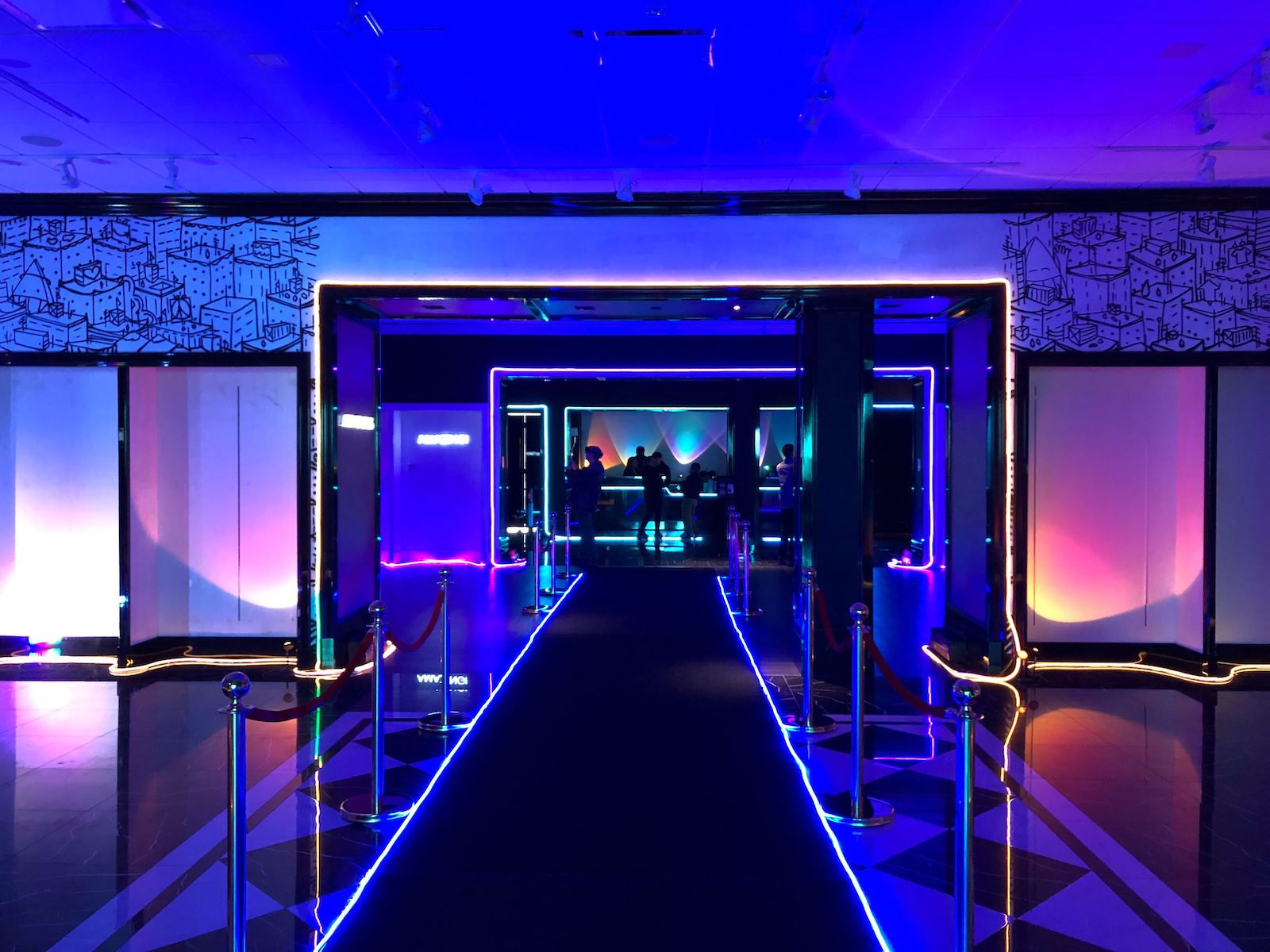After a successful debut in San Francisco, a first-of-its-kind NFT art exhibition, which will allow visitors to view digital art through an augmented reality headset, is coming to Denver.
When visitors first arrive at the Denver Pavilions’ new pop-up exhibit, they may initially be disappointed to see what appears to be an empty room. Once they put on the Microsoft HoloLens 2 headset (a pair of smart glasses that once put on, allow the user to explore a virtual 3D world), however, the space will transform to a digital art gallery, with pieces consisting of everything from a blooming lotus to a series of floating jellyfish.
The experience is part of VERSE: The Art of the Future, a show run by California-based tech startup Enklu that officially opens to the public on April 20 (an end date is yet-to-be-determined). It includes art from some of the biggest creators in the NFT space, including Bored Ape Yacht Club and BlockBar, as well as local artists like Chris Dyer, Hyperstasis, and Michelle Kohler. Denver will be the second city to host the augmented reality experience. Enklu held a similar exhibit in San Francisco this past February, during which Lyons-based artist Android Jones managed to sell his piece, “Electro Forest,” for 11 Ethereum (like Bitcoin, Ethereum is a cryptocurrency—one Etherum is worth approximately $3,000 U.S. dollars).
While all of the art featured is digital, most of the pieces are NFTs, or non-fungible tokens. For those who are not cryptocurrency connoisseurs, trying to understand what an NFT actually is can feel like taking a graduate course in rocket science. But Ray Kallmeyer, CEO of Enklu, thinks it’s simple.“What really trips people up when thinking about NFTs is they dive right into the ones and zeros and the heavy tech aspect of it,” Kallmeyer says. “But at its core, an NFT is just a digital collectible.”
While NFTs can take any form, from audio files to real estate, they’re most commonly digital art that can be purchased using cryptocurrency. And just like physical art, there is value in owning the original NFT, instead of, say, taking a screenshot of one, which would be the equivalent of buying a print of an original. As tech writer Mitchell Clark with The Verge explains, if you trade a Bitcoin for another Bitcoin, you still have a Bitcoin. Trade a one-of-a-kind trading card for another, however, and you have a completely different trading card. Collectors have even shown willingness to pay big crypto bucks for NFTs; pieces from renowned NFT collection Bored Ape Yacht Club sell by the minute for 140 Ethereum, around $430,000. “For the first time, digital artists can now earn an income from their work, just like traditional artists once could, and make a living off of these pieces,” says Kallmeyer.
The art world is trying to take advantage of the interest in NFTs—while also helping artists get paid—by promoting digital art work and hosting events. In October, Museum of Contemporary Art Denver held a four-part series on how NFTs are changing the art space. Local art gallery IRL Art even launched an NFT exhibit of its own in December.
As NFTs continue to grow in the art scene, Kallmeyer is hoping to lead the way. While VERSE won’t be the first NFT exhibit in Denver, it will be the first one to fully incorporate augmented reality. After a successful debut with the technology in San Francisco, Kallmeyer and his team began eyeing Denver as the next place to try out the virtual space. “From Meow Wolf’s Convergence Station to the First Friday Art Walks on Santa Fe, I’ve never seen such a vibrant art and cultural space like the one in Denver,” Kallmeyer says. “While New York and Las Vegas and San Francisco have a lot of stuff going on, there’s just something special about Denver that we knew we had to have a part in.”
A basic $20 ticket will allow visitors to see the art using a smartphone or tablet of their own, but we recommend going with the slightly pricier admission fee at $39 a ticket, which gives visitors the opportunity to fully immerse themselves in the experience with the Microsoft headset. A premium admission ($85) even comes with a collectible NFT, a sort of digital party favor.
Most of the NFT art on display is up for sale, with prices set by the artist, all in Ethereum, a cryptocurrency where one Ethereum is worth about $3,000. The nearly 50 pieces available include a stunning, realistic portrait by Michelle Kohler ($900) and an adorable pixie in a jar by artist Pixie Jars ($60).
As for Kallmeyer and his team, they hope to open other exhibits across the country after Denver, with dreams of even hosting international experiences. “In my opinion, this is the future of art galleries,” Kallmeyer says. “I know Denver residents will love it.”
If you go: VERSE: The Art of the Future is located at 500 16th Street Mall, Denver. Tickets range from $20 to $85.
Barbara oversees 5280’s fact checking processes and editorial internship program, as well as writes stories for 5280 and 5280.com.
All things Colorado delivered straight to your inbox.
Subscriber Services:
1-866-271-5280
5280 Publishing, Inc.
1675 Larimer St.
Suite 675
Denver, CO 80202
Phone: 303-832-5280
Fax: 303-832-0470
Author
Administraroot

